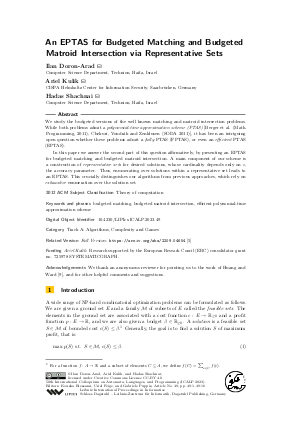@InProceedings{doronarad_et_al:LIPIcs.ICALP.2023.49,
author = {Doron-Arad, Ilan and Kulik, Ariel and Shachnai, Hadas},
title = {{An EPTAS for Budgeted Matching and Budgeted Matroid Intersection via Representative Sets}},
booktitle = {50th International Colloquium on Automata, Languages, and Programming (ICALP 2023)},
pages = {49:1--49:16},
series = {Leibniz International Proceedings in Informatics (LIPIcs)},
ISBN = {978-3-95977-278-5},
ISSN = {1868-8969},
year = {2023},
volume = {261},
editor = {Etessami, Kousha and Feige, Uriel and Puppis, Gabriele},
publisher = {Schloss Dagstuhl -- Leibniz-Zentrum f{\"u}r Informatik},
address = {Dagstuhl, Germany},
URL = {https://drops.dagstuhl.de/entities/document/10.4230/LIPIcs.ICALP.2023.49},
URN = {urn:nbn:de:0030-drops-181018},
doi = {10.4230/LIPIcs.ICALP.2023.49},
annote = {Keywords: budgeted matching, budgeted matroid intersection, efficient polynomial-time approximation scheme}
}

 Creative Commons Attribution 4.0 International license
Creative Commons Attribution 4.0 International license

















